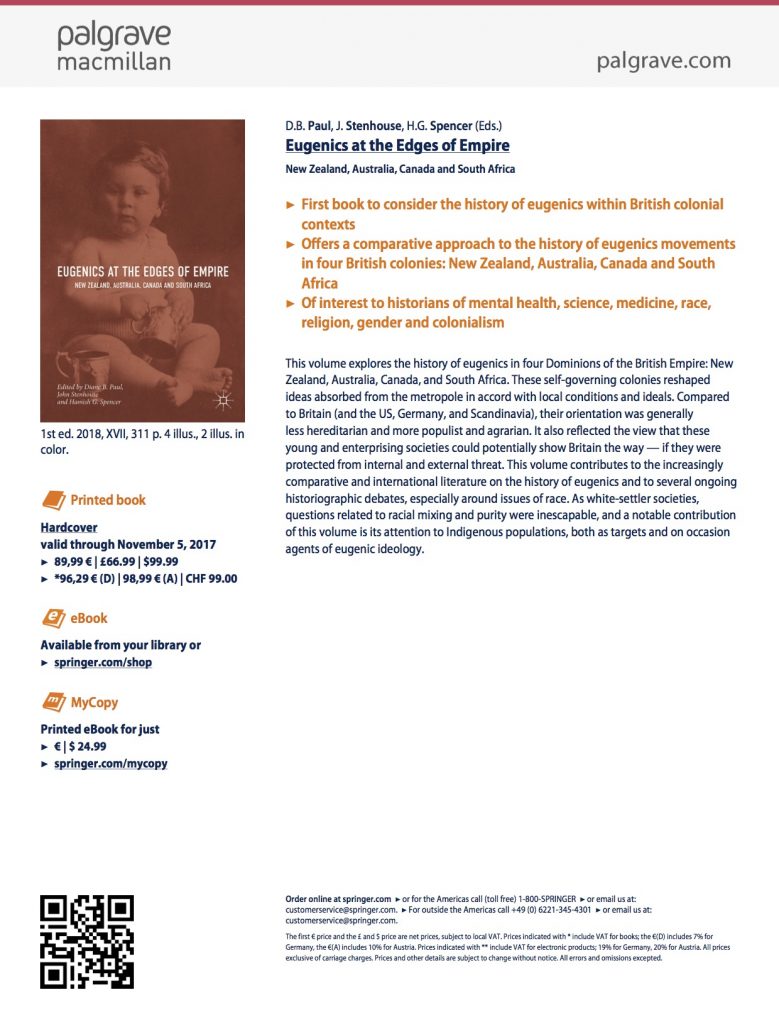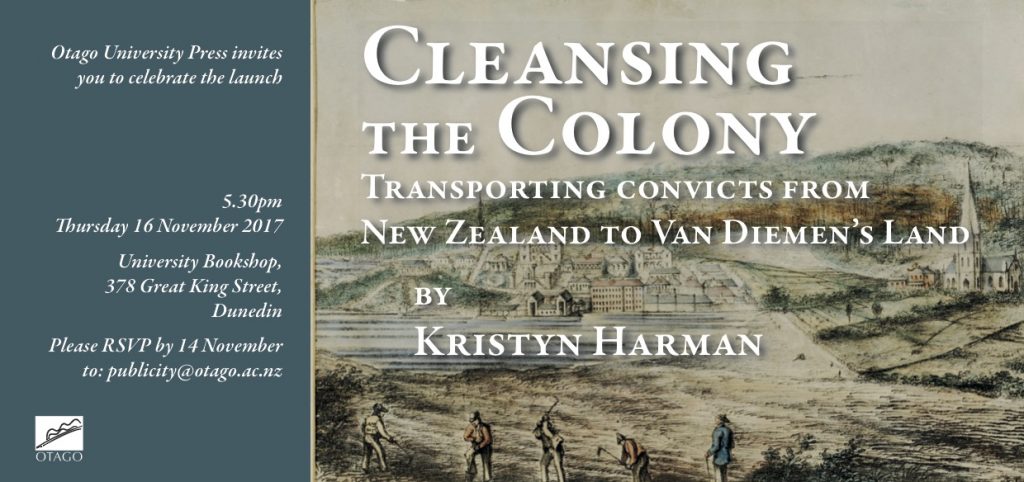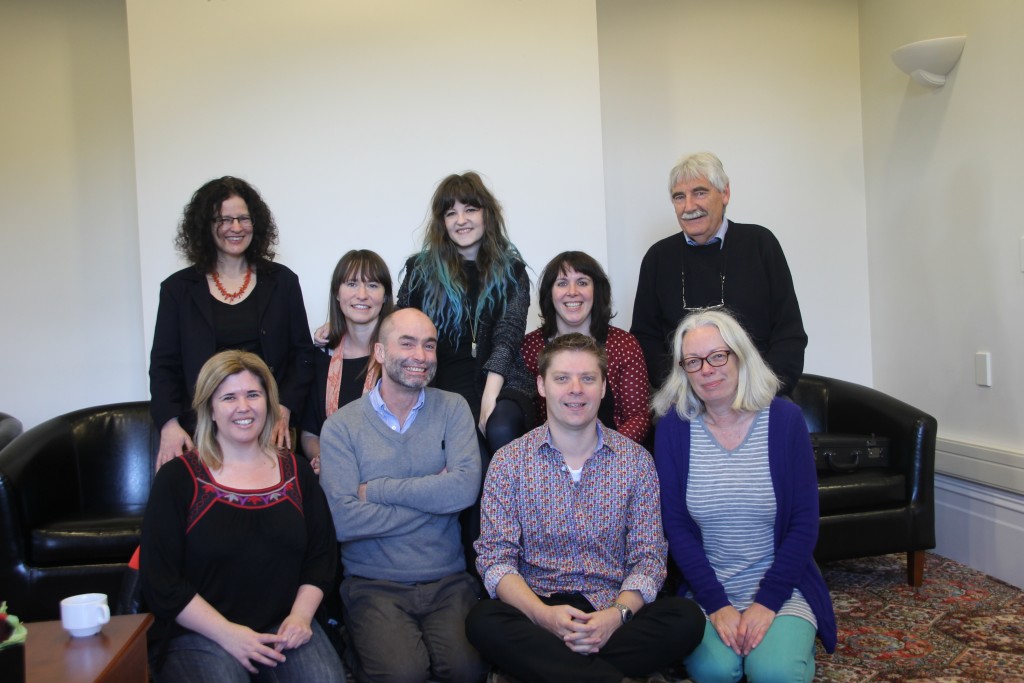CFP: Nga Taonga Tuku Iho 2018
The 2018 National Conference of the Archives and Records Association of New Zealand will take place from 25-28 August at Rotorua.
The theme of the conference is Māori archives and records. This theme and kaupapa allows for an exploration of the discovery, preservation, description, record keeping, interconnectedness and meaning of Māori records, archives and taonga. The 2018 conference looks to explore opportunities for researchers, communities and organisations to collaborate in the guardianship of knowledge, facilitate researcher engagement and help safeguard our collective past in perpetuity.
Areas of focus, and possible topics, could include:
- Iwi and community archives
- Conservation and preservation of collections
- Preventing and managing disasters
- Documenting heritage collections and taonga
- Collection descriptions for indigenous designed databases
- Record-keeping standards and authority headings
- Digitising collections
- Cultural sensitivities and archival ethics
- Research into Māori collections and archives
- Displacement of collections and repatriation
- Collecting archives in a post-Treaty environment
- Resourcing and funding challenges
- Ownership and kaitiakitanga
- Te Reo as part of the record
- Distributed collecting across institutions and iwi archives
- Connecting communities through records and archives
Proposals for 20 minute papers are invited. Abstracts of 450-500 words and a short bio should be submitted via email to Tiena Jordan (threejordans@xtra.co.nz) by the 31st March 2018.
Eugenics at the Edges of Empire
That’s the title of a book that has just been published by co-editors Diane Paul, Hamish Spencer and CRoCC member John Stenhouse. The collection emerged out of a two-day symposium organised by the editorial team at St Margaret’s College in early 2015 and sponsored by the Centre for Research on Colonial Culture. It features contributions from several Centre members (John Stenhouse, Barbara Brookes and Angela Wanhalla), in addition to chapters on New Zealand from a number of other scholars and researchers (Charlotte Macdonald, Caroline Daley, Diane Paul, Hamish Spencer and Emma Gattey). Essays on Australia (Stephen Garton and Ross L. Jones), Canada (Erika Dyck and Alex Deighton) and South Africa (Susanne Klausen), also feature, marking this as the first collection to focus on eugenics as it developed and was applied in the British Dominions. Many congratulations to the editors and all the contributors on the publication of this important collection.
Cleansing the Colony: Lecture and Book Launch
Dr. Kristyn Harman (University of Tasmania), who was a visiting scholar with the Centre in 2014, has returned to Dunedin for the launch of her latest book, Cleansing the Colony: Transporting Convicts from New Zealand to Van Diemen’s Land. She will also give a public talk on her book at Toitū.
Please feel free to come along to one or both of these events. Details are below:
Lecture: ‘Cleansing the Colony’, Tuesday 14 November, 10am at Toitū Otago Settlers Museum Auditorium.
During the mid-nineteenth century at least 110 people were transported from New Zealand to serve time as convict labourers in the penal colony of Van Diemen’s Land (Tasmania). Even more were sentenced by colonial judges to the harsh punishment of transportation, but somehow managed to avoid being sent across the Tasman Sea. In this talk, the remarkable experiences of unremarkable people like William Phelps Pickering, a self-made entrepreneur turned criminal; Margaret Reardon, a potential accomplice to murder and convicted perjurer; and Te Kumete, transported as a rebel will be explored. Their stories, and others like them, reveal a complex colonial society overseen by a governing class intent on cleansing the colony of what was considered to be a burgeoning criminal underclass.
Book Launch: Thursday 16 November, 5.30pm at University Book Shop, 378 Great King Street.
Katie Pickles awarded a James Cook Research Fellowship
The Centre for Research on Colonial Culture extends warmest congratulations to Prof. Katie Pickles of the University of Canterbury’s History Programme, and former President of the New Zealand Historical Association, on being awarded a prestigious James Cook Research Fellowship by the Royal Society Te Apārangi. Katie will use the James Cook Fellowship to research heroines in global history, a topic on which she has extensively published during her career. We extend our congratulations on this wonderful acknowledgement of her research excellence and celebrate the recognition this award brings to New Zealand’s colonial and post-colonial histories. All the best for the project, Katie.
New Book on Religious Childhoods
Creating Religious Childhoods in Anglo-world and British Colonial Contexts, 1800-1950 is a new co-edited collection from Centre member, Hugh Morrison, and Mary Clare Martin (Greenwich University, UK). This new book, published by Routledge, features children and religion in colonial society contexts such as New Zealand, and aims to develop greater understanding of religion as a critical element of modern children’s and young people’s history.
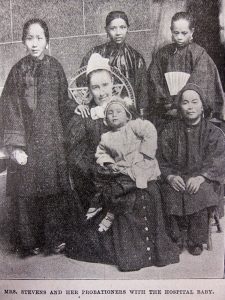
‘Mrs Stevens and her probationers with the hospital baby’, alongside article by Mary Budden, ‘Almora Christian Families’, in LMS Chronicle, July 1895, p. 182 (from Chapter 1, p. 27)
Arguing that religion was an abiding influence (positive, negative and benign) among British-world children throughout the nineteenth century and much of the twentieth, the book places ‘religion’ at the centre of analysis and discussion, while at the same time positioning the religious factor within a broader social and cultural framework. Essays written by an international grouping of scholars focus on a range of geographical settings: America, Australia, Britain, Canada, Fiji, India, New Zealand, South Africa and the South Pacific. The various contexts within which religion shaped childhood in these settings – mission fields, churches, families, communities, institutions, camps, schools and youth movements – are treated as ‘sites’ in which religion contributed to identity formation, albeit in different ways relating to such factors as empire, nation, gender, race, disability and denomination. Chapters on New Zealand include: an examination of southern Dunedin’s religious identity; children’s religious literature published by A.H. & A.W. Reed; and the ways in which religious identity was conflated with civic qualities of sacrifice and service.
CROCC Seminar: Ryan Tucker Jones
A Whale of a Difference
Changing Right Whale Culture and the Making of the Tasman World
The Centre is hosting Dr Ryan Tucker Jones of the University of Auckland who will be presenting a seminar on Tasman whaling history in relation to British encounters with Māori and Australian Aborigines.
This will be held: 11am-12.30pm, Tuesday 29 November, History Seminar Room (Burns 2N8). Please feel free to come.
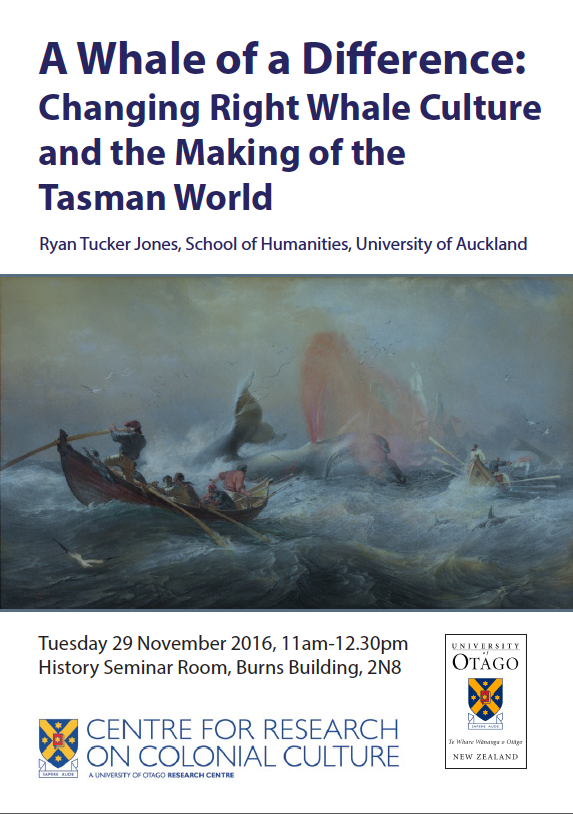 Abstract: “This paper examines the impact that changing right whale cultures had on cross-cultural encounters between British colonists, Aboriginal peoples, and Māori in Australia and New Zealand during the era of bay whaling, c.1805-1850. I argue that historians must take seriously the ways that environments (especially living environments) change in order to understand colonial and indigenous histories, and that comparative histories across the Tasman offers an ideal way to think through and document this history.”
Abstract: “This paper examines the impact that changing right whale cultures had on cross-cultural encounters between British colonists, Aboriginal peoples, and Māori in Australia and New Zealand during the era of bay whaling, c.1805-1850. I argue that historians must take seriously the ways that environments (especially living environments) change in order to understand colonial and indigenous histories, and that comparative histories across the Tasman offers an ideal way to think through and document this history.”
Book & Place Symposium
On 27 and 28 October, the University of Otago Centre for the Book is hosting its annual Research Symposium on the theme of Book and Place.
It will open on the evening of 27 October with a public lecture from Neville Peat in the Dunningham Suite, 4th floor, Dunedin Public Library, starting about 7.00 pm. You are cordially invited to come and listen to this well-known author reflect on his sense of book and place as he describes, in words and pictures, some of New Zealand’s most remote and precious areas and landmarks. An informal reception will follow the talk.
The Symposium proper will begin at the Marjorie Barclay Theatre, Otago Museum at 9.00 am on Friday 28. Professor Tony Ballantyne will begin proceedings, and after morning tea, Dr. Ingrid Horrocks of Massey University will deliver a plenary paper entitled: ‘Writing Place: A Case for Creative Nonfiction’. Nicky Page, Director of Dunedin’s UNESCO City of Literature programme will also be present. Please check out the full programme through the Centre for the Book blog
Importantly, for those attending the Thursday night ecture, please notify the Dunedin Public Library via their Library’s event site that you wish to attend.
To register for the symposium you need to send an email providing your name as you wish it to appear on your name tag and your email address to books@otago.ac.nz
There is no charge to attend the Symposium, which is generously supported by the Department of English and Linguistics, the Division of the Humanities, and the Centre for Research on Colonial Culture.
New Zealand Women’s History Conference
A reminder that abstracts for the Making Women Visible Conference are due by 31 August. We are excited to announce that in addition to special forums, there will be two keynote speakers: Dr Melissa Matutina Williams (Auckland) and Dr Frances Steel (Wollongong).
Get those abstracts in!
Making Women Visible: A Conference in Honour of Barbara Brookes
15-17 February 2016, University of Otago.
Making Women Visible honours Professor Barbara Brookes, one of New Zealand’s most important scholars, who has worked at the cutting-edge of historical enquiry for several decades. Over the course of her career, Barbara’s scholarship has encompassed diverse topics (including reproductive politics, mental health, film, photography, performance, race relations, disability, sexuality and feminism). These topics have been approached in imaginative ways (biography, the histories of emotion, comparative and transnational approaches), but throughout she has consistently placed women at the centre of her work.
This conference (15-17 February 2016) not only celebrates a distinguished career, but also marks the arrival of Barbara’s much-awaited survey history of New Zealand women, which will be officially launched as part of the conference programme. Its publication invites a renewed focus on New Zealand women’s history. It has been over twenty years since the suffrage centenary that was the catalyst for the publication of a number of important books, including Sandra Coney’s foundational survey history, Standing in the Sunshine. Since 1993, the number of books, edited collections, articles and theses concerned with aspects of women’s history has greatly expanded and the methodological approaches have undergone evolution. We think it is time, therefore, to reflect on the body of scholarship produced by historians since the early 1990s – to consider its impact on the teaching, researching, and writing of women’s history since then and also to look forward to where the field is headed.
The conference theme focuses on one of the core goals of women’s history, which has been to make women visible, therefore we invite papers that address ‘visibility’ from a variety of disciplinary perspectives. The conference committee particularly invites proposals for individual papers and panels that reflect Barbara’s areas of research, speak to the theme of visibility and consider the generation of scholarship since the early 1990s with a view to what has changed and what challenges lie ahead. We are especially keen to receive paper proposals from postgraduates as well as those working in the arts and heritage sector.
Please submit a 250-word abstract along with a short biographical statement by 31 August 2015 to crocc@otago.ac.nz
If you wish to propose a panel, please provide a panel title, along with abstracts and biographical statements for each presenter, and submit it to crocc@otago.ac.nz by 31 August 2015.
Conference committee: Jane Adams, Katie Cooper, Jane McCabe, Sarah Christie and Angela Wanhalla (University of Otago)
New Zealand’s Sexual Histories
Over the past two days a group of scholars have been talking about sex, and New Zealand’s sexual histories in particular. Angela Wanhalla and Chris Brickell, both Centre members, co-convened this event, funded by a Rutherford Discovery Fellowship and the Centre for Research on Colonial Culture, which brought together 10 scholars for a pre-read workshop at St Margaret’s College on 1 & 2 July. Participants discussed the benefits and limitations of demographic approaches to the study of sexuality (Hera Cook), New Zealand’s anti-masturbation movement (Lindsay Watson), the Health Department’s sex education pamphlets (Claire Gooder), non-monogamy and swinging in post-war New Zealand (Lily Emerson), sexuality and morality in colonial Otago (Sarah Carr), sexuality and infertility (Jane Adams), intimacy, desire and friendship in young people’s diaries (Chris Brickell), and childbirth on migrant ships (Ali Clarke). Professor Matt Cook (Birkbeck) also participated in the workshop, in addition to giving a beautiful and elegant public lecture based on his latest book, Queer Domesticities: Homosexuality and Home Life in Twentieth-Century London (Palgrave, 2014). A special issue of the New Zealand Journal of History based on the papers presented at the workshop will appear in 2016. And we highly recommend you go listen to Professor Matt Cook talk about his new book at Victoria University of Wellington on Monday 6 July. Find out more about his talk here.
Conference on New Zealand’s Scientific Heritage
CALL FOR PAPERS: FINDING NEW ZEALAND’S SCIENTIFIC HERITAGE
Venue: Victoria University of Wellington
Date: 23-24 November 2015
2015 is a significant year for New Zealand science history. It is 150 years since James Hector arrived in Wellington to set up many of our national science organisations and 100 years since Ernest Marsden arrived in Wellington.
In 1865 Hector was appointed head of the New Zealand Geological Survey, with his responsibilities eventually including the Colonial Museum, Colonial Observatory, Meteorological Service, Colonial Botanic Gardens, and the New Zealand Institute. In 1915, Marsden arrived in New Zealand to be professor of physics at Victoria University. He stayed in this position for seven years then, in 1926, was appointed head of New Zealand’s Department of Scientific and Industrial Research, a position he held until 1946.
In 1983, The Royal Society of New Zealand and the Alexander Turnbull Library ran a conference In Search of New Zealand’s Scientific Heritage. In the more than 30 years since this date there have been significant research and publications into New Zealand’s science history but there is still much to explore. The 2015 anniversaries invite a renewed focus on New Zealand’s science history and provide momentum leading up to the Royal Society of New Zealand’s 150th anniversary in 2017 and the 250th anniversary of the arrival of the first European scientists in 2019.
The conference committee invites proposals for individual papers, panels, and posters for Finding New Zealand’s Scientific Heritage, 23-24 November 2015. Proposals are due 30 June, 2015. Find out more about the conference, keynote speakers, and how to submit an abstract in the attached CFP.

